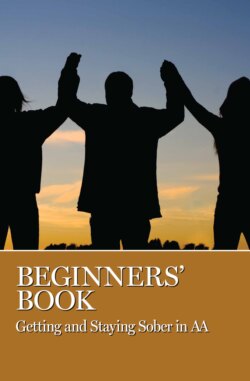Читать книгу Beginner's Book - Группа авторов - Страница 12
The Low-Down on a High Bottom
Оглавление“I never lost a job because of drinking.” “I still have my marriage.” “I’ve never spent the night in jail.”
When I hit my bottom, these statements were all true for me. I used them, early in sobriety, as a measuring stick, and so I determined that I was, indeed, a “high-bottom” drunk.
But, in time, as I began to work the AA program, I came to believe that my “bottom” had been lower than I’d thought. Much lower.
I discovered that my “yardstick” was irrelevant. For me, “hitting bottom” couldn’t be defined in terms of externals, like my job. Rather, it had consisted of a sort of slow, catastrophic leaching away of what I can only call my soul.
I have a long history of “stuffing” my negative emotions. Like so many others in AA, I grew up with a seemingly innate need to please other people: I was quiet, oh-so-polite, “nice” at any price.
At age twelve, I had an ulcerative stomach. At fourteen, I discovered the amazing curative properties of scotch and water (pilfered from my father’s liquor cabinet). Looking back, I believe I drank specifically to tame my inner “lion.” It worked, for awhile. I was a periodic drinker until I graduated from college. Around that time, I began to experience frightening bouts of free-floating anxiety, which I “cured” with my now daily consumption of white wine.
After graduation, I found a good job and maintained it. I married my college sweetheart. I had a few friends. But my drinking increased. Looking back, I see a young woman constantly in battle with a poor self-image. And the more I drank, the less important seemed the need for me to fight that battle.
Then, somewhere along the line, large sections of my personality began to shudder and close down. Gradually, I stopped talking to my friends. I continued to suit-up and go to work (horridly hungover, but managing to get by). I think I even continued to maintain my persona of being “nice.” Deep inside, though, a profound loneliness was taking root.
Fear, isolation, resentment: these became my intimate companions. The deep inner wells, from which springs the very “self,” were drying out. The walls were beginning to echo. After some time, the lonesome, hollow sounds of my own inner echoes began to grow louder than the frenetic pace of my daily, outer life.
Finally, in May 1992, I hit my personal, emotional bottom. It so happened I was alcohol-dry—abstaining, because I was pregnant with my second child. Without my shield of wine, I experienced physical withdrawal symptoms without a clue as to what they were. I felt completely, utterly alone, unconnected, dislodged, somehow, from the stream of life.
By the time I reached six months’ pregnancy—still “dry”—I was enduring panic and anxiety attacks so severe that I questioned my very sanity. It surprised me to discover that insanity hurts. I wanted to die. I couldn’t imagine living on and on with this fierce inner pain.
A blind phone call (and, I now believe, my Higher Power) connected me at last to a lifeline: a therapist with twenty years’ sobriety. She sent me to AA after our first session. I was so sick, so frightened, so desperate, that I obeyed her. In my unhealthy imagination, I saw this therapist as a person standing on the shore—watching me bobbing, far out at sea—and connected to me by a single piece of string.
It seems that powerlessness ought to have been easy to admit, but it wasn’t. Many of my early hours in therapy focused on Step One, and on dealing with the panic and anxiety.
I attended AA meetings every day. I had that eerie experience of listening to strangers describe my feelings and my drinking escapades, but still, I clung to the paper-thin belief that I was only present by default. That my “high bottom” qualified me as a “runner-up” alcoholic—not a full-blown “winner.” With this came the ancillary thought: that maybe I wouldn’t have to toil quite so hard in AA as some of those “low bottom” drunks.
From “Courage To Change” March 2000
When I was a newcomer I was one of those whom others “viewed with alarm” and so was my group. I was very young, female, dually addicted, and very, very socially unacceptable. And my group included almost every type of alcoholic that old-timers feared most: young people, addicts, people with mental illnesses, minority races, those with various belief structures or no belief at all, bikers, convicts, gays and lesbians. The amazing thing is that most of us stayed sober, despite all the dire predictions. Why? Because the two things we had in common were more important than all our differences. We were alcoholics and we believed in the program of Alcoholics Anonymous.
—MICKEY H.,
SPRINGVILLE, UTAH
I also had the mistaken idea that I could win a sobriety “lotto”—become sober for life, and never have to work the AA program again unless I felt like it—if only I could do all the Steps perfectly the first time around.
These illusions proved to be short-lived. As I continued in therapy, worked with an experienced sponsor, and learned a little something about humility, I gradually became aware of how much I needed AA. I didn’t know how to live life on life’s terms without taking a drink. I hadn’t even known I was unaware of that fact.
With the help of AA’s principles, its people, and my Higher Power, sometimes I now am actually able to “do the next right thing, leaving the results to God.”
Today, I focus on the simple fact that I am an alcoholic. Then, I get on my knees, and I thank God for AA.
PEGGY S.
HOUSTON, TEXAS
JUNE 1996
